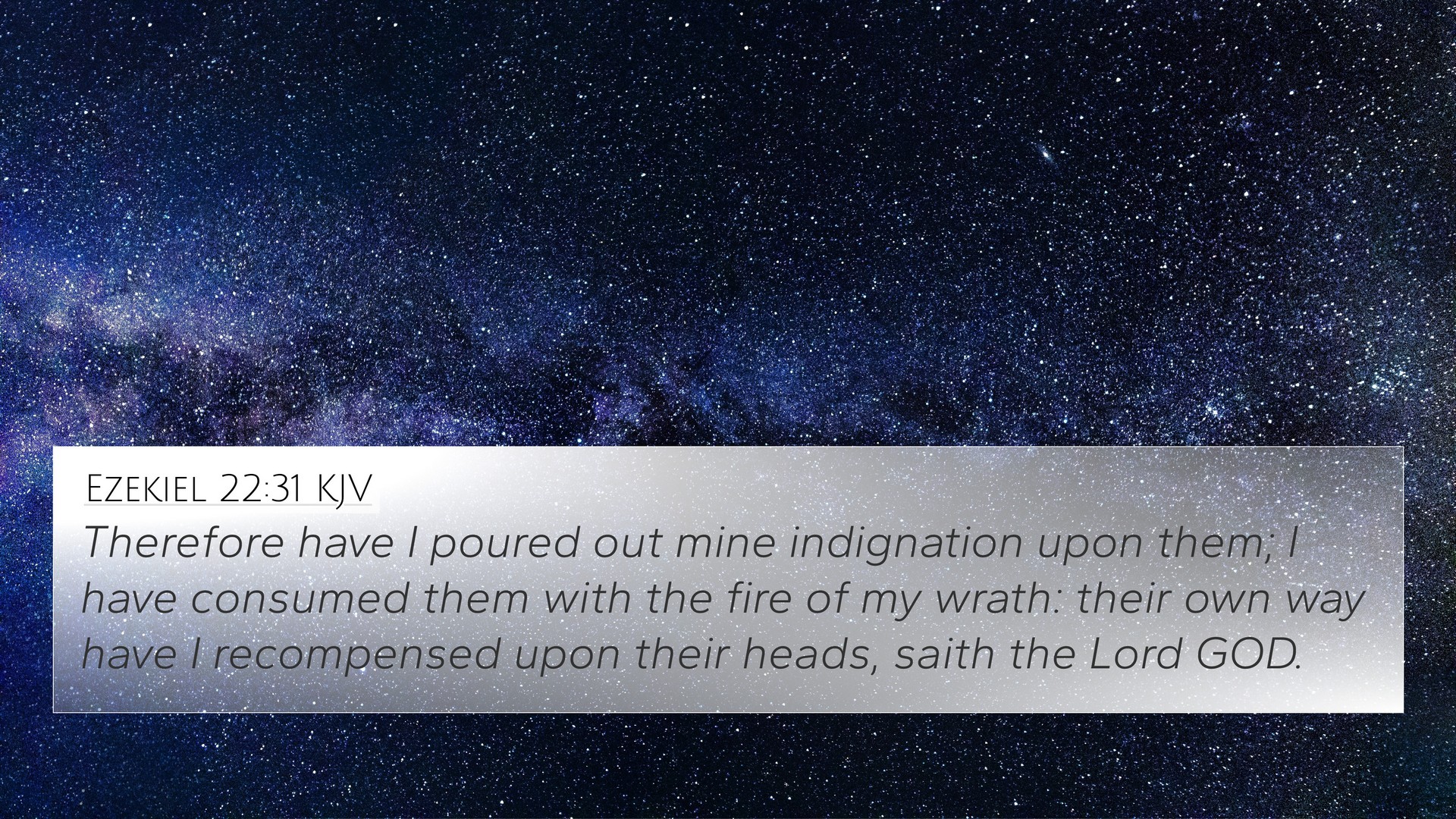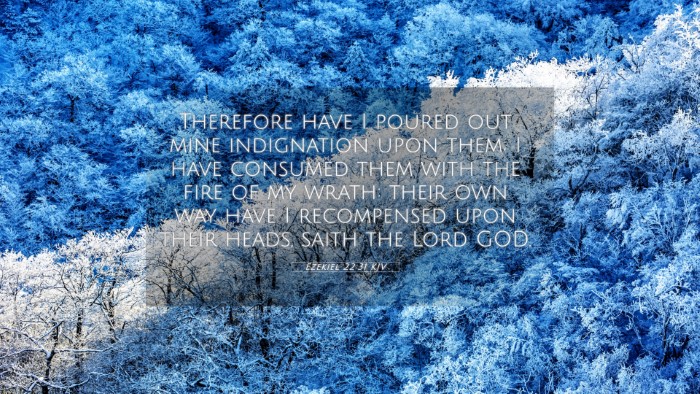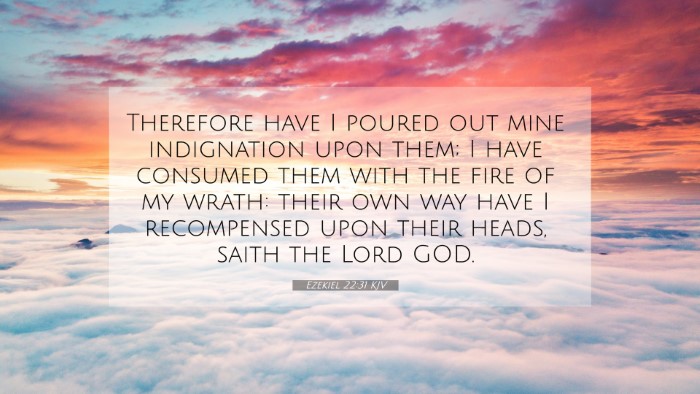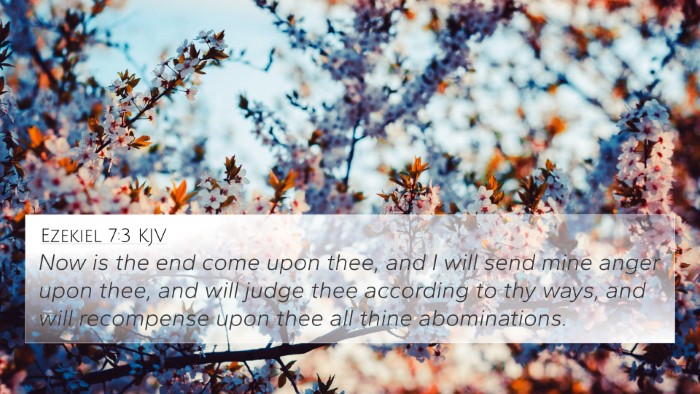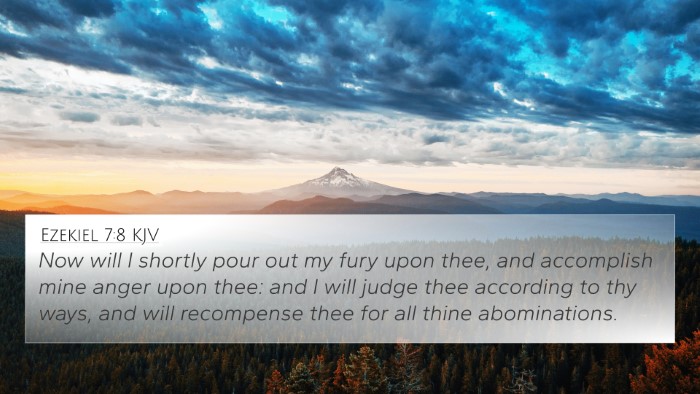Ezekiel 22:31 - Analysis and Meaning
Ezekiel 22:31 reads, "Therefore have I poured out mine indignation upon them; I have consumed them with the fire of my wrath: their own way have I recompensed upon their heads, saith the Lord God."
This verse expresses a profound significance regarding God's judgment upon His people. It highlights the themes of divine retribution and the consequences of disobedience.
Commentary Insights
-
Matthew Henry:
Matthew Henry emphasizes that God’s indignation is a righteous response to the transgressions of His people. He points out that the "fire of My wrath" signifies not only punishment but also the purifying aspect of God’s judgment, akin to the refiner’s fire that purges away impurities.
-
Albert Barnes:
Barnes interprets the phrase "their own way have I recompensed upon their heads" as a crucial reminder that the teachers and leaders of Israel led their people astray, and now they face the consequences of their actions. He underscores the individual responsibility that each person has for their deeds.
-
Adam Clarke:
Clarke discusses the metaphor of fire extensively, asserting that while it represents destruction, it also connotes a necessary cleansing force applied to a rebellious nation. The fire reflects both the severity of God's judgment and His ultimate desire for repentance and restoration.
Thematic Connections in Scripture
Understanding Ezekiel 22:31 requires a familiarity with the broader themes woven throughout the Bible. This passage resonates with numerous other biblical texts that offer rich insights into God's character and His interactions with humanity.
Related Bible Cross-References
- Jeremiah 21:14: Highlights God's promise to repay according to the works of the people.
- Isaiah 66:15-16: Refers to the Lord's fury as a consuming fire towards those who oppose Him.
- Romans 1:18: Discusses the wrath of God being revealed against ungodliness and wickedness.
- Galatians 6:7: Teaches about sowing and reaping, emphasizing that individuals will reap what they have sown.
- Revelation 20:15: Discusses the final judgment and the recompense of the wicked.
- 2 Thessalonians 1:6: States that it is a righteous thing with God to repay tribulation to those who trouble you.
- Hebrews 10:27: Speaks of a certain fearful looking for judgment and fiery indignation, a direct correlation to Ezekiel's message.
Understanding Direct and Indirect Connections
The exploration of Ezekiel 22:31 through cross-referencing allows for a deeper comprehension of biblical relationships and themes. By analyzing how this verse connects with other scriptures, one can unravel the cohesive narrative of God's desire for justice, mercy, and ultimate redemption.
Inter-Biblical Dialogue
Linking the prophetic books with the New Testament and understanding the overarching themes of divine justice provides critical insights for the believer. The cross-references create a foundational understanding of divine judgment that is consistent across the biblical narrative.
Tools for Bible Cross-Referencing
Utilizing tools such as a Bible concordance or a cross-reference Bible study guide can assist in the identification and examination of these connections. Engaging with a comprehensive Bible cross-reference system enables a more profound understanding of scripture.
How to Use Bible Cross-References
When studying a verse like Ezekiel 22:31, one can follow a methodology that involves identifying keywords within the verse, and then searching for those keywords throughout the biblical texts. This practice illustrates the seamless connections between disparate verses and themes.
Conclusions and Applications
The significance of Ezekiel 22:31 resonates not just in its immediate context but serves as a warning and a call to reflection for believers today. Understanding God’s justice as portrayed in this scripture encourages believers to align their hearts with God's principles to avoid the dire repercussions outlined in the verse.
- Final Reflection: The exploration of scripture through cross-referencing enhances the clarity of God’s message and solidifies the belief in divine justice.
